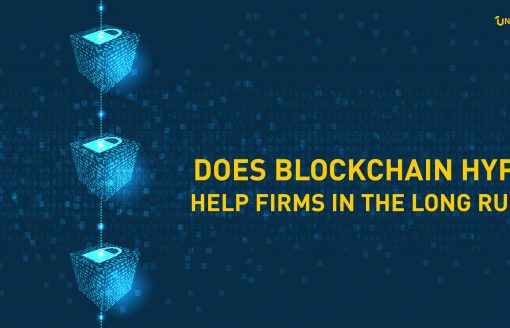Blockchain technology is venturing into almost all possible fintech industries. Now blockchain is also started to disrupt the healthcare industry.
Healthcare industry is one of the many industries that contribute largely to the economy of any country. A statistical report by the Centers for Medicare and Medicaid Services shows (https://www.cms.gov/Research-Statistics-Data-and-Systems/Research-Statistics-Data-and-Systems.html) that healthcare spending is expected to cover almost 20% of the United States national economy 2025-end.
Where there is huge revenue there is also the pressure to regulate the costs, expenses and at the same time also provide high-quality services. The risk involved in the healthcare industry is much more when compared to other fin-tech industries.
The patient record is a vital element in the healthcare industry, most hospitals today still employ the traditional systems to keep track of this data, the traditional system acts are a huge roadblock hence creating unnecessary risks. This fragments the data and makes it complex for healthcare professionals to share relevant information between one another.
Now different hospitals have different record-keeping techniques. The report by MIT Technology Review in 2017 (https://www.technologyreview.com/s/608821/who-will-build-the-health-care-blockchain/) explained that there are 26 different Electronic Medical Record Systems (EMR) used across different hospitals and facilitators in Boston alone — each representing data differently. Such distinctions result in lack of transparency between different healthcare institutions.
This also results in inefficiency and cost increase, also the process of information flow becomes tedious and inefficient which might even cost a patients life. A recent Johns Hopkins study claims more than 250,000 people in the U.S. die every year from medical errors. Other reports claim the numbers to be as high as 440,000. https://www.cnbc.com/2018/02/22/medical-errors-third-leading-cause-of-death-in-america.html
A Blockchain Powered Clinical Health Information Exchange has the ability to provide a brand new model for health information exchanges (HIE) by making electronic medical records (EMR) more efficient and cryptographically guarded.
Blockchain platforms have the bandwidth to maintain the entire lifecycle of a patient’s electronic medical record. The advantages of having blockchain for healthcare record are:
> Eliminates unnecessary administrative units which also reduces the friction and costs of current mediators that handle health information exchange
> Connects different disintegrated systems and makes it possible to generate better acumens and assess the value of care being given to patients
> Allows patients’ records to be accessed by different health care providers from any place and at any time, this typically gives both patients and medical professional quicker entrance to all their healthcare information across all the providers
> Use of blockchain in healthcare industry also provides patients the chance to grant anonymous access of their personal medical records to researchers
Greg Matthews, the creator of MDigitalLife, a platform for tracking digital trends in healthcare, said about blockchain in healthcare as: “Blockchain could make the biggest impact in healthcare in enabling health outcomes that take a 360° view of the patient’s genetic profile, their demographic and socioeconomic status, the behaviors that impact their health, and their response to different treatments or combinations of treatments”.
“This data exists today in one form or another, but can be tremendously difficult to stitch together at an individual level. Blockchain can enable “profile stitching”, and do so in such a way that the patient’s identity is protected.” Matthews added.
Blockchain in medicine; supply-chain
Projects in the global pharmaceutical industry involve the distribution and supply of a surplus of products across multiple countries and jurisdictions, with important factors of safety, security and data protection at every step.
Digital ledgers are already being designed that can be used to track each stage of the supply chain, enabling manufacturers to reduce counterfeiting and other types of fraudulent activity.
In Texas, USA, One Network Enterprises has designed an end-to-end fulfillment product that manages the distribution process of essential medical supplies.
Noting significant “global implications of substandard, falsified, and counterfeit medical products,” CTO Ranjit Notani says ONE Blockchain allows “the ability to maintain confidentiality at all levels while maintaining a single version of the truth for every transaction.”
A naturally open system works to the advantage of new participants. Blockchain could help smaller drivers in supply chain management, particularly in developing countries, to gain the safety.
In most developing countries, retailers anticipate months for payment for delivered medicines and can fight to access financing due to a lack of credit records.
Easysight Supply Chain Management (https://www.bloomberg.com/profiles/companies/600093:CH-easysight-supply-chain-management-co-ltd), located in China, helps solve this problem with the introduction of the blockchain platform which is intended to track drugs through encrypted trading records. This process makes it easy for small companies to access credit and reduce the time consumed in payments.
This process ultimately results in the medicines reaching the patients at a considerably lower cost.
Improved Medical Research
Blockchain helps the life sciences organizations to focus on their main practice without having to worry about data management, data origin, and data ownership. It will also provide scalability and security.
In global studies, data is gathered from several labs across multiple countries. The information gathered through these needs to be shared in an anonymized. These process of recording, gathering and then sharing in an anonymized way can be quite tedious and blockchain can come as a great help. The other probable advantages of blockchain in medical research would be:
High-resolution photos of medical reports
Trial protocol
Biological results
Informed consent forms
Real-time record of every submission
Record details
As blockchain is gaining huge popularity over time and getting adapted to numerous other industries like logistics, alcohol-tracing, consumer products, it is likely that a number of potential applications will only increase in the future.






Does blockchain hype help firms in the long run?